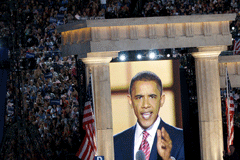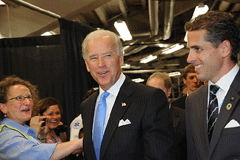Environment Takes Center Stage at DNC
Air Date: Week of August 29, 2008

Senator Barack Obama accepted his party’s nomination for presidential candidate and promised to invest $150 billion in renewable energies if elected. (Photo: Jackson Solway, Courtesy of the Democratic National Convention)
Now that the Democrats have wrapped up their convention, Living on Earth assesses the growing importance of the environment, climate change and energy to the party as the race for the White House heats up. Host Steve Curwood talks with Washington correspondent Jeff Young from the convention floor in Denver. We also take a look at Vice Presidential nominee Joe Biden’s environmental record. Senior Reporter Darren Samuelsohn of the online environmental news service Greenwire tells LOE producer Mitra Taj that Senator Biden’s foreign policy experience includes efforts to get the U.S. to act on climate change.
Transcript
[THEME]
CURWOOD: From the Jennifer and Ted Stanley studios in Somerville, Massachusetts, This is Living on Earth. I’m Steve Curwood.
The bunting is gone. The Obama signs packed up, the barriers taken down. The delegates to the Democratic National Convention went home from Denver with renewed calls for change and unity. And those concerned about the environment and energy found climate change in the list of top priorities cited in the historic acceptance speech of nominee Barack Obama.

Democratic Presidential Nominee Barack Obama greets guests at the Democratic National Convention in Denver, Colorado. (Photo: Audrey Rose, Courtesy of the Democratic National Convention)
CURWOOD: And with the state of the climate clearly linked to the state of the nation’s security and economy. Obama declared there is now a great opportunity to find low carbon ways to put America to work.
OBAMA: As president I will tap our Natural gas reserves, invest in clean coal technology and find ways to safely harness nuclear power. I’ll help our auto companies retool, so that the fuel-efficient cars of the future are built right here in America.
CURWOOD: And Barack Obama is prepared to pour in taxpayer money.
OBAMA: I’ll invest 150 billion dollars over the next decade in affordable renewable sources of energy, wind power, and solar power, and the next generation of biofuels - an investment that will lead to new industries and five million new jobs that pay well and can’t be outsourced.
CURWOOD: With me now is Living on Earth’s Jeff Young who spent a week at the convention. Hi there.
YOUNG: Hey Steve.
CURWOOD: Now Jeff in past election cycles, environmental activists have complained that the issue of global warming didn't get the attention it deserved. I guess this year's kinda different, huh?
YOUNG: Absolutely. And you know it's almost not even a quote, unquote "environmental" issue by itself anymore. I think there’s that connection between climate concerns energy costs, the economy, national security all tied up together, and collectively those things are right near the top of voter concerns and, so of course, they're getting a lot of play in the campaign rhetoric.
CURWOOD: Alright, so now the Democrats have recognized the problem, what do they propose doing about it?

Senator Barack Obama accepting his party’s nomination for presidential candidate. (Photo: Jackson Solway, Courtesy of the Democratic National Convention)
CURWOOD: Let's hear a little sampling of some of the green moments in the big speeches:
GORE: It just so happens that the climate crisis is intertwined with the other two great challenges facing our nation: reviving our economy and strengthening our national security. The solutions of all three require us to end our dependence on carbon-based fuels.
HILLARY CLINTON: We need a President who understands we can’t solve the problems of global warming by giving windfall profits to the oil companies while ignoring opportunities to invest in new technologies that will build a green economy.
SCHWEITZER: It’s not a question of either wind or clean coal, solar or hydrogen, oil or geothermal. We need them all to create a strong American energy system, a system built on American innovation.
CURWOOD: Now Jeff I recognized two of those voices, of course Al Gore and Hillary Clinton. But who was that last voice we heard from?

Montana Governor Brian Schweitzer speaking at the DNC.
CURWOOD: But his message is a little different from the others. I mean Al Gore and Hillary Clinton are talking green energy and bashing big oil, Governor Schweitzer was saying we need more oil and more coal.
YOUNG: Well that's right and that points to a real tug of war that was going on just below the surface here in Denver as the Democrats were trying to strike a balance on energy. They very much want to reach out to states like Governor Schweitzer’s Montana, where people dig coal and drill oil but also have a lot of potential for wind and biofuels. Same kind of story in say, Virginia. Very important electoral state. Former Virginia Governor Mark Warner, who's now running for Senate, gave the convention's keynote address. Warner supports expanding offshore drilling. So People like Warner, Schweitzer and other moderates from energy producing states, they want their party to compromise. They know they’re getting hurt by Republicans who have very effectively seized on the issue of high-energy prices with a pro-drilling message. And those moderate Democrats want to respond with a message that says yes to some drilling yes to some coal yes to a lot of green energy too, sort of an "all of the above" message.
CURWOOD: Somehow, I got the impression that that’s not going to play so well with the greener elements of the party. What do you think?
YOUNG: Not at all, and there is quite a bit of tension within the party over this. And we heard some pushback against any kind of expansion of drilling from some top Democrats, including Harry Reid of Nevada. He’s the senate’s majority leader.
REID: The simple fact is that the promise of more oil isn’t part of the solution; it’s part of the problem. At best this is an 18th century answer to a 21st century crisis. At worst it’s pure baloney.
YOUNG: So this is not an issue where all the Democrats are on the same page just yet and I think it’s gonna be interesting to see what sort of message Obama and Biden decide they’re going to emphasize.
CURWOOD: Now Senator Obama used the Convention to showcase his running mate, long time Delaware Senator Joseph Biden. Of course part of the vice presidential candidate's role is to go on the attack against the opposition. And Joe Biden certainly did just that. He went after Republican nominee John McCain's environmental record.
BIDEN: Even today, as oil companies post the biggest profits in history— nearly a half trillion dollars in the last five years—John wants to give them another $4 billion dollars in tax breaks. That’s not change, that’s the same. And during the same time John voted again and again against renewable energy: solar, wind, biofuels. That’s not change; that’s more of the same.
CURWOOD: So Jeff what do you make of that?
YOUNG: I think it’s interesting because McCain has really has been an advocate for cutting greenhouse gas emissions. But, as Biden pointed out there, Senator McCain has not voted for the kind of government support for alternative energy that a lot of people in the green field want to see. In fact he missed some very critical votes this year. So Democrats are going to try to draw sharp distinctions by digging down into the McCain record – make him seem kinda like President Bush – too cozy with big oil, that sort of thing.
CURWOOD: Now Joe Biden has spent a lot of time on the Senate Foreign Relations committee, most recently as chair. Mitra Taj spoke with Darren Samuelsohn. He’s a senior reporter for the on-line environmental news service Green Wire.
TAJ: Senator Biden is of course very well known for his foreign policy leadership in the Senate, what can you tell us about his environmental record?
SAMUEHLSON: Well as the chairman of the senate foreign relations committee for the last two years he has been a leader in trying to prod the Bush administration into taking a more proactive approach in international global warming negotiations, and actually holding hearings in the senate committee that he is in charge of, to put the spotlight on all the international complexities of climate change and that means thinking about how rising temperatures and rising seas and the effects in developing nations can have on U.S. national security.

Senator Joseph Biden. (Courtesy of the Democratic National Convention)
TAJ: Could he be more successful as a vice president than as a senator?
SAMUEHLSON: Absolutely, as a vice president, as we saw with Dick Cheney here in the last eight years, a vice president certainly can have a lot of influence in how policy is shaped and as a statesman and someone who has been in the senate for more than two decades, he knows what it takes to get legislation through and he knows what it would also take, very importantly to get a treaty ratified. Ultimately that’s the goal in the international climate negotiation processes, is to get a treaty in place in the 2012, 2013 time period that would be ratified by the United States Senate which take 67 votes, which is a huge hurdle to overcome. And as the former chairman of the Senate Foreign Relations Committee, Senator Biden, if he was the vice president, certainly knows what levers need to be pulled to try and make that happen.
CURWOOD: That’s Darren Samuelsohn of Green Wire speaking with Living on Earth’s Mitra Taj.
CURWOOD: So Jeff tell me, how would Joe Biden do as president of the Senate—one of the official duties of the Vice President of the United States?
YOUNG: Well you never know. He might end up casting the deciding vote on an energy or climate change issue. I think we know there are going to be very hard fought battles. And it’s a little ironic that here we have candidate Biden on the attack against Republicans on this issue, but as Senator Biden, really worked very well with Republicans on climate change – partnered with the top Republican on the Foreign Relations committee. If there is an Obama-Biden administration he’s going to have to return to that bi-partisan mode if he really wants to get anything done.
CURWOOD: And what about before the election? Won’t Joe Biden and Barack Obama have some problems getting their own party in line on the green agenda?
YOUNG: Uh, that may turn out to be just as tough. There’s a real diversity of opinion on energy issues among Democrats and I got a sense of that by walking around the floor and talking to Delegates from different states. I asked them, “What do you think Obama’s top priority should be, as President, when it comes to energy and the environment?”

(Photo by Jackson Solway, Courtesy of the Democratic National Convention)
HOLMES: My name is Representative Lindsey Holmes and I am from Anchorage, Alaska. I think at this point in time the top priority’s got to be renewable energy. It’s got to be energy security and weaning us off fossil fuels and onto the great renewable potential that we have here in the U.S. and we are an oil and gas state and even up there we got plenty to spare at this point but even we are putting huge efforts into renewables and really weaning ourselves off the dependence on foreign oil.
COUWNIE: I’m Frank Couwnie, Mayor of the city of Des Moines. We can create a lot of green jobs around this country by urging conversion to energy efficient buildings and residences and commercial buildings and save a lot of the greenhouse gases that emitted from coal plants. We have to switch to renewals and off of fossil fuels and that ought to be one of our absolute top priorities.
MARSHALL: My name is Charlene Marshall and I’m from Morgantown, West Virginia. Course I’m hoping in energy he’s going to be working with West Virginia because we produce so much coal and we’re just in the process of building a refinery in Moundsville, West Virginia for coal liquefaction and I’m hoping that he will come to the table and that we’ll be able to do some things with the coal and that will produce some much needed jobs throughout West Virginia.
CURWOOD: Thanks Jeff. We’ll come back to you in a bit. Just ahead: The greening of the Democratic platform. You’re listening to Living on Earth.
[MUSIC: Organissimo : “Traces” from Groovadelphia (Big O Records 2008)]
|
**WEB EXTRA** Biden's Enviro Record - Listen to Gene Karpinsky, president of the League of Conservation Voters, talk with Steve Curwood about Joe Biden’s environmental score.
Links
|





